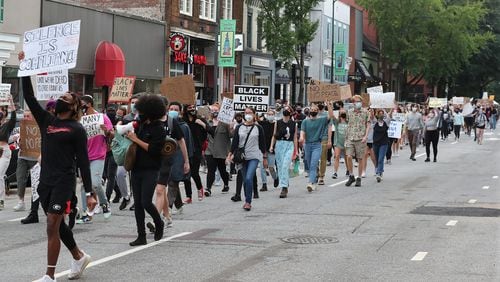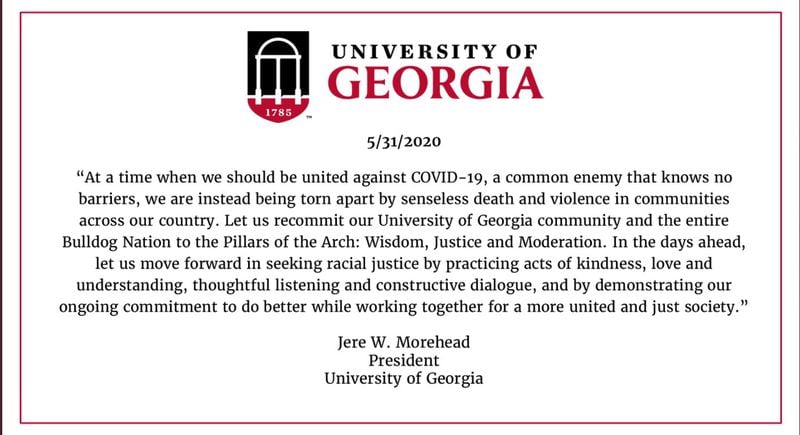After calling home to report how unknown white males interrupted a September Zoom meeting of the Hispanic Student Association to shout obscenities, a University of Georgia freshman told The Red & Black, the student newspaper, that her mother replied: “That’s just what happens when you’re at UGA.”
That’s a worrisome indictment of the state’s flagship campus, but an accurate. All too often, UGA leadership offers tepid responses to racism.
That’s led to defensive action by students, including the take-no-prisoners campaign by student activist Arianna Mbunwe to call out racism, including when aimed at her by the brothers of Lambda Chi Alpha fraternity. On social media, Mbunwe shared repugnant sexist and racist remarks about her by frat members in a chapter GroupMe page, turning a national spotlight on UGA and leading the chapter to suspend operations.
Nicole García Sánchez, president of the Hispanic Student Association, said the university makes empty statements about wanting students of color to attend UGA, but, “We definitely do not feel appreciated and supported once we are here. They need to do more to make this a more welcoming campus for minority students.”
For example, García Sánchez and other student leaders were disappointed in the UGA president’s response to the deaths of Ahmaud Arbery in Brunswick, George Floyd in Minneapolis and Breonna Taylor in Louisville. UGA President Jere Morehead issued a bland statement urging “kindness, love and understanding, thoughtful listening, and constructive dialogue.”
Contrast Morehead’s bowl of mush with the strong bone broth served up by Washington State University President Kirk Schulz, who opened his lengthy statement to his campus with: “Racism looms over our nation’s soul. Breonna Taylor. Ahmaud Arbery. George Floyd. Three on a seemingly endless list of African American fathers, mothers, sons, daughters, loved ones, and family members, all of whom were killed because they were black. Each a recent and stark reminder and memorial of the ugliness of historic, systemic inequality ... Black lives matter."
Chastened after students and alums complained he never mentioned Black Americans, Morehead released a second statement in which he assured Black students that he stood with them and pledged to work for racial justice, but still avoided mentioning Black Lives Matter.
García Sánchez was frustrated over the university’s response to the intrusion of xenophobia and racism into her organization’s opening meeting. She says the university initially chided the Hispanic Student Association for drawing attention to its meeting by advertising it on social media, something every student organization does.
“Their first response was to blame us. In this instance, we didn’t get adequate support,” she said in a telephone interview.
The university remains rooted on the sidelines even as UGA students become more active around social justice, including racism and sexual assault on campus, said García Sánchez. “I believe the university has not adapted. They don’t seem to take a stand on anything. My guess is that they don’t want to upset anybody so they are afraid to act.”
In response to such concerns, UGA spokesman Gregory Trevor said last week “Several senior administrators at the University of Georgia continue to engage in direct dialogue with students of color — including Latinx students — in order to foster open and honest conversation on issues that are of concern to them. Such conversations can be difficult, but they are important. They reflect President Morehead’s commitment that no member of our UGA community — whether student, faculty or staff — should have to deal with racist or horrible comments directed at them. We still have much to do as we continue to battle racism, but the University community is coming together to do it.”
“UGA consistently cites the First Amendment and freedom of speech," said Ciera M. Thomas, president pro-tempore of the Student Government Association Senate. “I understand that to some extent, but I think there’s a lot that UGA can do to support their marginalized communities that they aren’t doing. Freedom of speech goes both ways, and I think UGA can say a lot more than they do right now.”
A week ago, Morehead approved a recommendation from the Presidential Task Force on Race, Ethnicity and Community to create a diversity educator position to expand access to diversity and inclusion training for all university faculty and staff. The diversity educator will also serve as a liaison with Student Affairs to develop training for students. Morehead will consider other diversity initiatives recommended by the task force.
Trevor also said the culprit in the Zoom-bombing incident was from the New England area and not a UGA student. García Sánchez said, “Right now, we don’t know the connection on how he would have found us. We are working on that."
While UGA has formed diversity and inclusion committees to combat racism, it hasn’t succeeded in changing the culture at UGA, as evidenced by a stream of racial episodes, often involving Greek organizations. The typical response from leadership is a declaration that such behaviors will not be tolerated.
And that is what UGA announced after the Lambda Chi incident, which Trevor said remains under investigation, while the frat continues to be suspended from all activities. In a group chat, Lambda Chi members ridiculed fellow student Mbunwe’s tweets about UGA Greek Life’s indifference to COVID-19. “Lord give me the strength to not call that woman a racial slur,” said one poster. Under the screen name of “Ghost of Aunt Jemima,” another frat member said, “(She) just sits in her room saying how white people are racist because she’s mad she didn’t get a bid lmao.” The chat also contained other graphic racist, sexist and homophobic remarks.
Racism within Greek organizations at UGA is getting a public airing on a new testimonial site and petition called Pledge Against Racism. Among the 100 accounts of former sorority and fraternity members about the racism they witnessed:
“I was in a sorority all four years and, while I enjoyed the experience overall and met some of my best friends through that experience, I always felt very not okay about the lack of diversity within the Greek system. I went to a very diverse high school, and many of my best friends were people of color. After joining a sorority, many relationships I had with high school friends became strained — mostly because of the whiteness of my new friends. And how not inclusive they were. Something I didn't see at the time and that I deeply regret now."
“KA Fraternity dropped their social with AOII my sophomore year of college (fall 2013) because we had non-white women in our new pledge class. I threatened to go to the Red & Black about it and faced significant push back from members of my sorority. I requested that at the very least, our sorority never engage in any form of social or event with KA again."
“I was member of a sorority that cut an African-American girl during rush solely because of her skin color. She was an incredible candidate and the chapter would have been lucky to have her. However, our advisers told us that they cut her because if we had a black member of our sorority our alumni would no longer donate to our chapter. I've never been more heartbroken and disappointed in humanity after this act."
“I graduated UGA in 2015, but dropped my active fraternity status in 2013 after we had a chapter-wide meeting to vote if we should allow a Hispanic student in, which would make him the first minority member in our chapter's history. It was disgusting the remarks that were made. Some said we should only allow him in if he wore a straw hat out front and watered our plants and landscaped during pledgeship. I'm a young white man of privilege and I'm ashamed of not speaking out enough during my tenure in my fraternity."
These testimonies don’t shock journalist John Hechinger, author of “True Gentlemen: The Broken Pledge of America’s Fraternities.”
“These racial divisions are unbelievably ingrained and date to the 19th century when fraternities basically shut out black members and minority members,” said Hechinger. “Until colleges address this and focus on inequities, fraternities are going to promote segregation on campus.”
In the old row Southern frats, Hechinger says an emphasis remains on admitting legacies, which locks out students of color. “If you go into a frat or sorority house and see the composites on the wall of pledge classes, there are seas of white faces going back for decades,” he said.
While the excuse is often made that fraternities and sororities are off-campus organizations, Hechinger said colleges often provide vital support for them, including housing offices of Greek life on campus. And it’s critical for a frat or sorority to be formally recognized by the university, which gives the school clout to remove the biases built into rush and recruitment and require Greek membership reflect the racial and ethnic makeup of the campus.
In the South, fraternities remain well financed and well represented by former members in high places, including the Georgia Legislature. Even if only 20% of students belong to Greek organizations, Hechinger said they often represent the largest voting bloc on a campus. And Greek organizations — with their willingness to host parties and allow alcohol — are often social engines on campuses.
But fraternities and sororities with virtually all-white memberships are out of step on increasingly diverse campuses. “Universities have long looked the other way at segregation in Greek life, but to the extent that people come out and talk about it, it could very well change," said Hechinger.
An international student, García Sánchez did not think to research the culture of UGA or the percentage of minority students when she decided to enroll. “I came to tour and fell in love with the campus," she said. "I would not say I regret coming to UGA, but I want to leave this campus better than when I got here. I am doing the work to change it so future students don’t have to.”
About the Author








